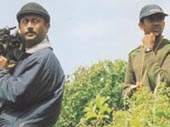| TV
Times
|
||||||
|
Vimukthi achieves
success in no time This was made
when this film was selected to be screened in the competitive section
of 13 "Marseilles" International film festival, one of
the main documentary film festivals held in Europe. This was the
first time that a Sri Lankan film was selected to this festival.
Number of big names in the international film arena including Anand
Pathwardan of India, Ming Luing of Taiwan and Australian film maker
Andrew Healer too had participated this festival. The jury comprising
Portuguese film maker Pedro Costa noted that according to the director's
note the film had questioned the 'knowledge of the history' by looking
at present days tragedies through the eyes of the past. Depicting the
life of disabled soldiers from civil war which had been going on
for nearly 20 years was produced by the Film Unit of the Government
Information Department of Sri Lanka. Jayasundera's film portrays
the struggle of a man who has been trained in the use of limbs for
his routine work but according to the current need goes in search
of new methods to satisfy his needs without limbs. "The Land
of Silence" was scripted and directed by Jayasundera himself
and the camera by Sunil Sri Perera and edited by Nuwan Katugampola. His second
short film "In the Empty for Love" (Vide Pour L'Amour)
is under final touches at the French Film Studio "Le Fresnoy".
The film built around youth living in two different societies based
on the Czechoslovakian novelist 'Milan Kundera's statement was filmed
in Anuradhapura in Sri Lanka and in France last April and May. "In the
Empty for Love" was first screened last June at Film Festival
in France and it is scheduled to be released in French cinema halls
from January 2003. Vimukthi's
career started when he made a telefilm at 17 years and later became
a script writer for an advertising firm from 1998 to 2001. He studied
the medium of films at FTII in Pune in India and it was at this
time he made his first film for silver screen "The Land of
Silence". Having won an scholarship Vimukthi went to France
to study cinema for three years becoming the first South Asian to
undertake this course. Twenty five year old Vimukthi is now working on his first feature film for 'Home Green Film' company based in France and Taiwan. His two short films were selected to open the 10th North African International Film Festival held in November. Abeysekara:
Peerless lyricist 'Karu' as he
was affectionately called, whose seventy-second birth anniversary
was celebrated by his fans and by the Sri Lanka Broadcasting Corporation
recently. He wrote over 2000 lyrics during his lifetime which was
considered a record for any artiste associated with radio, film
and television. In his songs
there is an element of sadness. When in another song he sings; "Mage
Desama Piyavi Yanne, Obe Rupayamai Diswanne" (My eyes aree
closing and your image alone is seen), what he tries to express
is the love that had been shattered. Most of the songs he wrote
are heard everyday, proving his popularity among the listeners because
of the words that evoked feelings among both the young and the old.
One of his early songs "Enna Mada Nale Gos Pavasanna Duka Mage"
which meant: (come mild wind and convey my sad feelings), speaks
of a lover sending a message through the mind to his beloved living
far away. In another,
" Oruwaka Pavena Re Gana Andure, Thotiyeki Ma Me Seethala Wature",
he speaks of a ferry man longing for his dear one's affections.
It is his lamentation for the love now in separation. Most of Karu's
songs were set to Tamil and Hindi tunes taken from popular films
made in India. They were imitative songs but cleverly wrote his
words without damaging the lyrical aspect of the songs. The popular
singers of his time, H.R. Jothipala and J.A. Milton Perera, sang
most of his songs. Even Milton Mallawarachchi became known because
of Karunaratne Abeysekera's songs which strirred the imagination
of the young people. His song; "Ipida
Mare Yali Ipide Nothira Sasara Sagare" in the Daskama, showed
the qualities of a poet in him. He won the coveted Sarasavi Award
on two separate occasions for his songs. Nanda Malini
too sang one of his best songs, "Ada Pamanak Nove Apata Hetak
Thiyanawa", Evoking national filings in the listeners. The song expressed
hope and glory of the motherland. Although he was caught up in the
commercial world when he was commissioned by the film-makers to
write songs with a popular taste, there has been an element of poetry
mixed with romanticism which contributed a great deal in the development
of Sinhala songs. |
||||||
Copyright © 2001 Wijeya Newspapers
Ltd. All rights reserved. |
